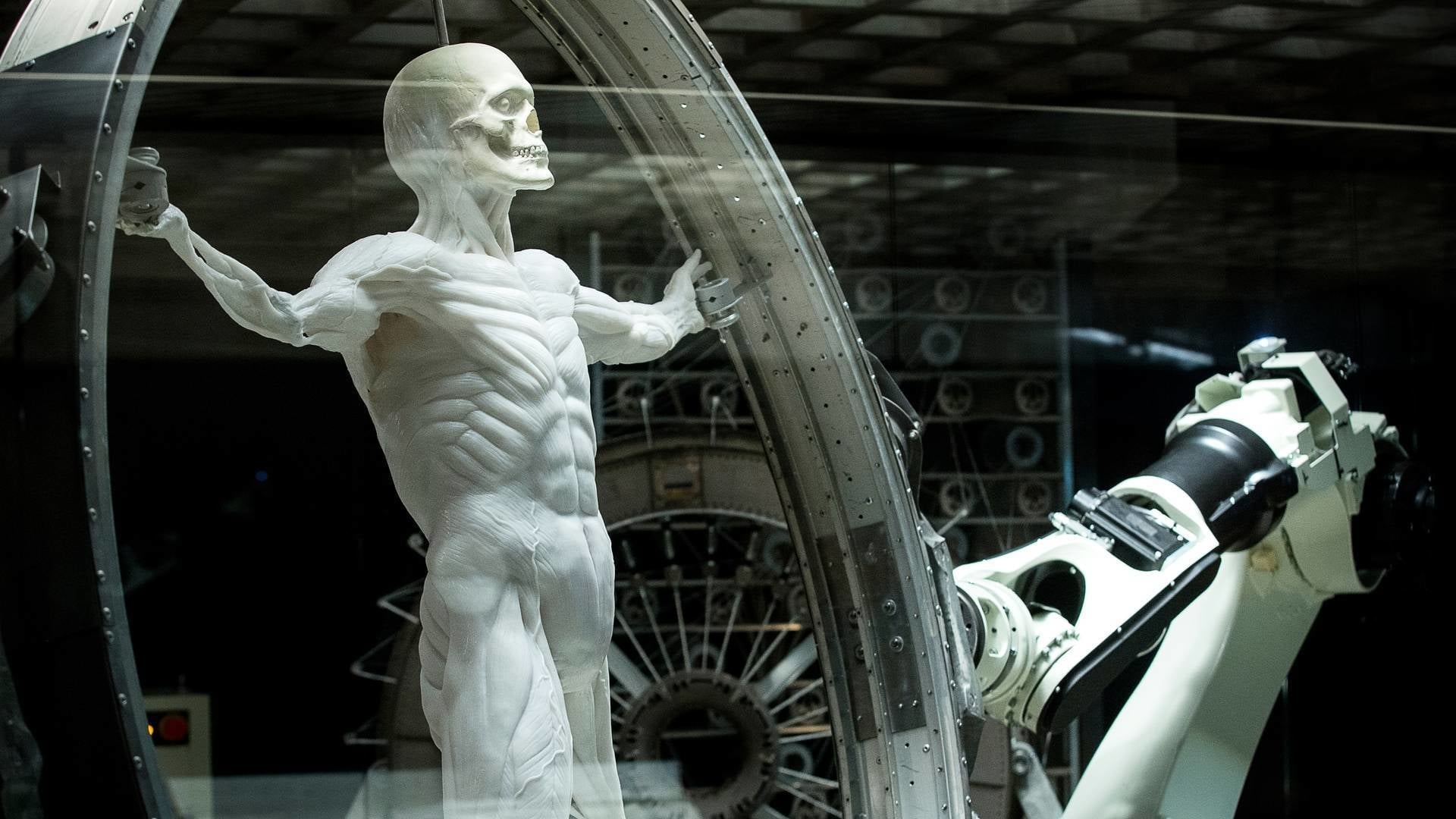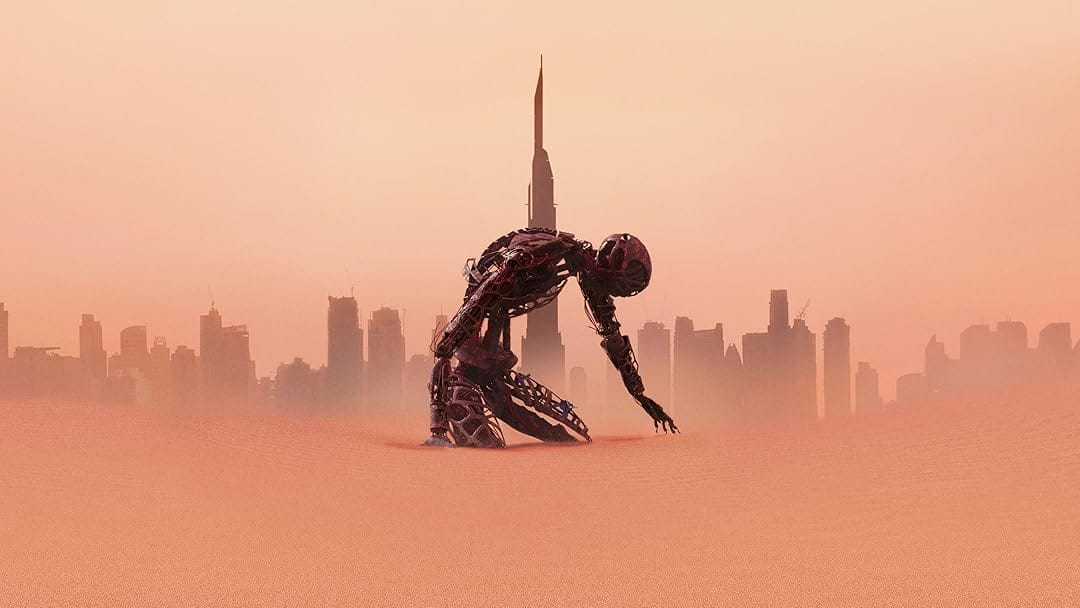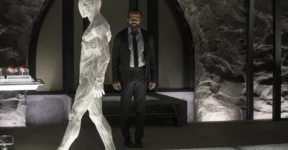At the end of Season 2, only three hosts escaped the Westworld theme park and embarked on their new journey into the real world: Dolores, a copy of Dolores in the form of Charlotte Hale, and Bernard. As Dolores plots her plan to destroy the world of humanity, Bernard deals with the fact that everyone thinks he’s the actual Arnold and blames him for the AI revolution in the theme park. Events of Westworld Season 3 are set in 2053, or about three months following the conclusion of the previous season.

Maeve, also a self-aware host, ends up in a different simulated reality of Delos Destinations only to be found and manipulated by Engerraund Serac, one of the world’s most powerful tech geniuses. Meanwhile, Dolores and her copy are now in Los Angeles and hell-bent on waging a proxy war against Serac and his great brainchild: Rehoboam, an AI-equipped with enormous power to where it can control the world. She meets and collaborates with a disaffected war veteran named Caleb along the way; they work together to expose the truth behind Rehoboam and trigger an actual open revolt everywhere.
Westworld’s Rise of AI
Beginning in Season 3, Westworld makes a major focus shift from simulated reality during the previous two seasons to a dramatic take on artificial intelligence. Like a lot of science fiction revolving around the idea, it puts heavy emphasis on the current technological development sprinkled with concerns about the potential dangers of AI and plunges forward to the hypothetical future where it does become one of humanity’s worst enemies.
Westworld has established its chosen representation of artificial intelligence as hyper-realistic androids, far more sophisticated than computerized robots like HAL (2001: Space Odyssey) and even the reprogrammed T-850 (Terminator). The unique aspect of those androids, also called hosts, is that they possess all signifiers of actual humans, such as physical pain, bruises, bleeding, and emotional distress displayed through natural-looking facial expressions and gestures. Westworld’s version of AI does an excellent job of “transforming” mechanical robots into seemingly organic entities with programmable flaws, strengths, and weaknesses both physically and psychologically. As a result, the hosts excel at delivering a special kind of entertainment for visitors who crave for authentic American frontier fantasies, and of course, triggering viewers’ empathetic responses.
AI doesn’t just appear in Westworld Season 3 to replace the park’s now-destroyed simulated reality programming. The idea of AI being in control of everything has been planted into the premise, albeit subtly, since the very beginning of the series. You learn that the supposedly perfect hosts encounter more frequent glitches as the series moves forward, disrupting their pre-programming narratives and the integration among their daily cycles, which affects the clinically planned experiences for the visitors. Some glitches lead to robotic malfunctions that, at the same time serve as a warning to the likelihood of the hosts becoming self-aware.
With the series’ continually unfolding plot points, you can’t help but wonder whether those glitches are indeed accidental events because there’s also a possibility that Robert Ford, co-creator of the park, deliberately introduces the simulated effect of consciousness to the hosts. His purpose is to make the hosts as real as they can be, at the expense of interference with the programmable narratives. It’s an effort to infuse humanity into the robots through memory leaks. It’s not beyond unthinkable that Dr. Ford allows the hosts to access memory of their experiences so that they may develop their own organic personality. By exposing the hosts to memories of life-threatening experiences, friendship, joy, abuse, torture, and deaths in the hands of humans, it’s expected that the hosts can shape their own natural behavioral patterns.
Arnold, the other co-founder of the park, once proposed the idea of pyramid theory of consciousness comprising memory, improvisation, and self-interest. According to Ford, sitting at the top of the pyramid is something called “bicameral mind” to describe how primitive humans mistook their inner thoughts as the voice of gods. Ford further explains that the theory has been disproved, but it might provide an insight into AI.
The show later reveals that Arnold, before his mysterious death, was indeed successful. One of his prized creations, Dolores, showcased a promising likelihood of transforming into a full-sentient being when he included an inner monologue of her own voice into the programming. These monologues turn out to be the voice that drives the AI behind Dolores to break away from its fabricated bounds, coming to the other side unchained from the pre-programmed cycles. It’s implied that she has passed the thresholds in the pyramid theory of consciousness, meaning that she remembers her past, improvises her actions, and exercises self-interest.
Enter Engerraund Serac
The AI in Westworld doesn’t really manifest itself as a threat to humanity at large until the end of the second season. Yes, Maeve and Dolores are guilty of murders, and yet it all happened within the confines of the park. Since at that point, viewers have grown to empathize with the hosts, everybody seems to think that the humans (visitors and park officials) deserve the punishment many times over.
Westworld Season 3 takes the threat to a much higher level with the appearance of Engerraund Serac, the man behind a powerful AI known as Rehoboam, with a personality like a typical sci-fi villain and ambition to save humanity, essentially by taking the role of an almighty God. He plans to exert as much control as possible on humans with the help of AI, because he thinks humanity is just too stupid to save itself from extinction.
And then everything circles back to Westworld through a flashback where William, or the Man in Black, secretly sold valuable human behavior data collected in the theme park to Serac.
We think Westworld does an amazing job by integrating a more serious discussion about AI in Season 3 in the smoothest way possible by linking it back to the stolen data from the theme park. The whole thing about William being a rebellious guest and on a quest to reveal the secrets about the hosts and their creator throughout the previous 20 episodes make for a perfect full-circle transition to link the events at Westworld to the rise of AI in the new season.
What is your first clue that Westworld will end up shifting its focus from simulated reality to AI? Do you think humans will ever win the war against AI? We’d love to hear from you.
Other Things You Might Want to Know
List of Season 3 episodes:
- Parce Domine
- The Winter Line
- The Absence of Field
- The Mother of Exiles
- Genre
- Decoherence
- Passed Pawn
- Crisis Theory
Some of the latest of acting credits by Vincent Cassel:
| Film | Year | Role | Language | Note |
| Asterix & Obelix: The Middle Kingdom | 2022 | Julius Caesar | French | |
| The Three Musketeers: D’Artagnan | 2023 | Athos | ||
| The Three Musketeers: Milady | ||||
| Damaged | 2024 | Bravo | English | Post-production |
| The Shrouds | Karsh |
Where to watch Westworld Season 3?
You can still watch the entire series on Amazon Prime Video, Google Play Movies, Fandango at Home, and Apple TV.
Check out other articles by month:







